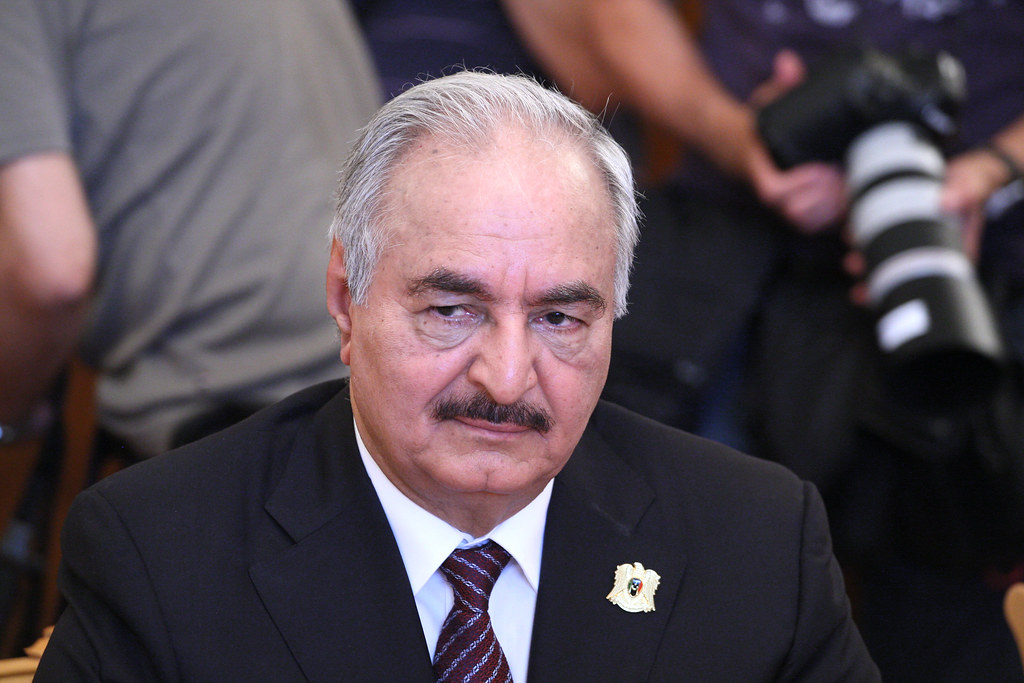by Ahmed Charai
The threat posed by extremists in Libya and Tunisia is not one that Europeans can ignore
- Turkey, which signed a military and economic accord with the Libyan government in November, could deprive Greece and the Greek Cypriots of large swaths of their oil and gas exploration areas and force Egypt and Israel to negotiate with Turkey over the construction of natural gas pipelines to Europe.
- The threat posed by extremists in Libya and Tunisia is not one that Europeans can ignore, as evidenced by the attack on British tourists in Sousse and the more recent attack by Tunisian Anis Amri in Berlin.

Turkish
President Recep Tayyip Erdogan opened the way on December 26 for direct
military intervention in Libya: he announced a parliamentary vote in
early January on sending troops to support the UN-backed Tripoli
government against General Khalifa Haftar (pictured). (Image source:
Russian Foreign Ministry/Flickr)
|
Turkish President Recep Tayyip Erdogan opened the way on December 26 for direct military intervention in Libya: he announced a parliamentary vote in early January on sending troops to support the UN-backed Tripoli government against General Khalifa Haftar. Instructors, equipment and Turkish special forces are already operating in Libya alongside pro-government militias. Erdogan said that Turkey would also be willing to send aerial and naval assistance if circumstances require it.
Sending Turkish troops will complicate the situation in an already fragile country, torn by internal dissent since the ouster and killing of the dictator Muammar Gaddafi in 2011.
The map of foreign intervention in Libya is important: In the east of the country, forces from Saudi Arabia and Egypt support Gen. Haftar, the separatist who heads the Libyan National Army -- not the country's national army. Arrayed against them are Turkey and Qatar, supporting the recognized government headed by Fayez al-Sarraj, but his government is not supported by the legislature. Then there is Russia. It has dispatched militia forces known as the Wagner Group, which have already carried out operations in Syria, are also operating in several African countries -- supporting and assisting Haftar's forces. France has joined the group of countries that support the rebel general, while Italy backs Sarraj's recognized government.
As it has done in Syria, the United States has so far refrained from any intervention. Instead, the US has clung to the position of an outside observer, ready to offer advice and diplomatic assistance to resolve the Libyan crisis. Turkey, which signed a military and economic accord with the Libyan government in November, could deprive Greece and the Greek Cypriots of large swaths of their oil and gas exploration areas and force Egypt and Israel to negotiate with Turkey over the construction of natural gas pipelines to Europe.
Libya is now one of the main axes of future ISIS operations, to compensate for the loss of ground in Syria. ISIS in Libya finances its activities through robbery, kidnapping for ransom, extorting Libyan citizens and cross-border smuggling of artifacts and other commodities.
The Tunisian daily newspaper Al-Chourouk cited statements by Ahmad al-Mesmari, a spokesman for East Libya-based forces, claiming that there were "open lines" to provide weapons and fighters from Turkey and Malta to the Tripoli-based government. The Turkish ambassador to Tunisia, Omer Faruk Dogan, has denied the claim.
The impact that the Libyan crisis has had on neighbors is far reaching and significant. Egypt, a major recipient of US military and economic assistance, can ill afford a spillover of insecurity from Libya. In addition, the movement of migrants through Africa to Egypt and Libya and on to Europe is a major concern for countries in the southern Mediterranean. Tunisians make up one of the largest groups of foreign fighters in Iraq and Syria, and insecurity in Libya offers a safe haven for extremists who could seek to foment radicalization in neighboring Tunisia. The threat posed by extremists in Libya and Tunisia is not one that Europeans can ignore, as evidenced by the attack on British tourists in Sousse and the more recent attack by the Tunisian, Anis Amri, in Berlin.
Ahmed Charai
Source: https://www.gatestoneinstitute.org/15348/libya-instability-turkey
Follow Middle East and Terrorism on Twitter
No comments:
Post a Comment